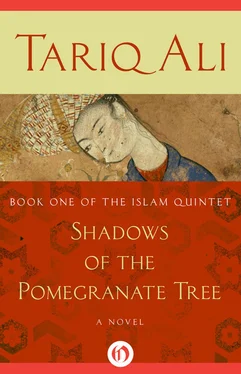Tariq Ali - Shadows of the Pomegranate Tree
Здесь есть возможность читать онлайн «Tariq Ali - Shadows of the Pomegranate Tree» весь текст электронной книги совершенно бесплатно (целиком полную версию без сокращений). В некоторых случаях можно слушать аудио, скачать через торрент в формате fb2 и присутствует краткое содержание. Жанр: Современная проза, на английском языке. Описание произведения, (предисловие) а так же отзывы посетителей доступны на портале библиотеки ЛибКат.
- Название:Shadows of the Pomegranate Tree
- Автор:
- Жанр:
- Год:неизвестен
- ISBN:нет данных
- Рейтинг книги:4 / 5. Голосов: 1
-
Избранное:Добавить в избранное
- Отзывы:
-
Ваша оценка:
- 80
- 1
- 2
- 3
- 4
- 5
Shadows of the Pomegranate Tree: краткое содержание, описание и аннотация
Предлагаем к чтению аннотацию, описание, краткое содержание или предисловие (зависит от того, что написал сам автор книги «Shadows of the Pomegranate Tree»). Если вы не нашли необходимую информацию о книге — напишите в комментариях, мы постараемся отыскать её.
The savagery of the Reconquest tore apart the world of the Banu Hudayl family. For the doomed Muslims of late-fifteenth-century Spain, the approaching forces of Christendom bring not peace but the sword. Capturing the brutality of a war both military and cultural — and the price paid by the innocent — Tariq Ali opens his Islam Quintet with a harrowing and profound historical fiction.
Shadows of the Pomegranate Tree — читать онлайн бесплатно полную книгу (весь текст) целиком
Ниже представлен текст книги, разбитый по страницам. Система сохранения места последней прочитанной страницы, позволяет с удобством читать онлайн бесплатно книгу «Shadows of the Pomegranate Tree», без необходимости каждый раз заново искать на чём Вы остановились. Поставьте закладку, и сможете в любой момент перейти на страницу, на которой закончили чтение.
Интервал:
Закладка:
‘We must cancel our plan. A friend in the palace has sent us a message. Ximenes has trebled his guard and has cancelled his plans to visit the city today. I felt there was something strange in the air. Did you notice that the streets were virtually deserted?’
Zuhayr could not conceal his delight.
‘Allah, be praised!’ he exulted. ‘Fate has intervened to prevent our sacrifice. But you are right, Ibn Amin. The atmosphere is tense. Why is this so? Has it anything to do with the royal bailiff’s errand?’
While they continued to speculate and began to discuss whether they should venture back to the streets and investigate the situation, an old servant of the Funduq ran into their room.
‘Pray masters, please hurry to the Street of the Water-Carriers. The word is that you should take your weapons.’
Zuhayr picked up his sword again. The others uncovered their daggers as they rushed out of the Funduq al-Yadida. They did not have to search very hard to find the place. What sounded like a low humming noise was getting louder and louder. It seemed as if the whole population of the quarter was on the streets.
Through the fringed horseshoe arches of homes and workshops, more and more people were beginning to pour out on to the streets. The beating of copperware, the loud wails and an orchestra of tambourines had brought them all together. Water-carriers and carpet-sellers mingled with fruit merchants and the faqihs. It was a motley crowd and it was angry, that much was obvious to the conspirators of the Funduq, but why? What had happened to incite a mass which, till yesterday, had seemed so passive?
A stray acquaintance of Ibn Amin, a fellow Jew, coming from the scene of battle, excitedly told them everything that had happened till the moment he had to leave in order to tend his sick father.
‘The royal bailiff and his soldiers went to the house of the widow in the Street of the Water-Carriers. Her two sons had taken refuge there last night. The bailiff said that the Archbishop wished to see them today. The widow, angered by the arrival of soldiers, would not let them into the house. When they threatened to break down the door she poured a pan of boiling water from the balcony.
‘One of the soldiers was badly burnt. His screams were horrible.’
The memory choked the storyteller’s voice and he began to tremble.
‘Calm down, friend,’ said Zuhayr, stroking his head. ‘There is no cause for you to worry. Tell me what happened afterwards.’
‘It got worse, much worse,’ began Ibn Amin’s friend. ‘The bailiff was half-scared and half-enraged by this defiance. He ordered his men to break into the house and arrest the widow’s sons. The commotion began to attract other people and soon there were over two hundred young men, who barricaded the street at both ends. Slowly they began to move towards the bailiff and his men. One of the soldiers got so scared that he wet himself and pleaded for mercy. They let him go. The others raised their swords, which was fatal. The people hemmed them in so tight that the soldiers were crushed against the wall. Then the son of al-Wahab, the oil merchant, lifted a sword off the ground. It had been dropped by one of the soldiers. He walked straight to the bailiff and dragged him into the centre of the street. “Mother,” he shouted to the widow who was watching everything from the window. “Yes, my son,” she replied with a joyous look on her face. “Tell me,” said Ibn Wahab. “How should this wretch be punished?” The old lady put a finger to her throat. The crowd fell silent. The bailiff, Barrionuevo by name, fell to the ground, pleading for mercy. He was like a trapped animal. His head touched Ibn Wahab’s feet. At that precise moment the raised sword descended. It only took one blow. Barrionuevo’s severed head fell on the street. A stream of blood is still flowing in the Street of the Water-Carriers.’
‘And the soldiers?’ asked Zuhayr. ‘What have they done to the soldiers?’
‘Their fate is still under discussion in the square. The soldiers are being guarded by hundreds of armed men at the Bab al-Ramla.’
‘Come,’ said Zuhayr somewhat self-importantly to his companions. ‘We must take part in this debate. The life of every believer in Gharnata may depend on the outcome.’
The crowds were so thick that every street in the maze had become virtually impassable. Either you moved with the crowd or you did not move at all. And still the people were coming out. Here were the tanners from the rabbad al-Dabbagan, their legs still bare, their skin still covered with dyes of different colours. The tambourine makers had left their workshops in the rabbad al-Difaf and joined the throng. They were adding to the noise by extracting every sound possible from the instrument. The potters from the rabbad al-Fajjarin had come armed with sacks full of defective pots, and marching by their side, also heavily armed, were the brick-makers from the rabbad al-Tawwabin.
Suddenly Zuhayr saw a sight which moved and excited him. Scores of women, young and old, veiled and unveiled, were carrying aloft the silken green and silver standards of the Moorish knights, which they and their ancestors had sewn and embroidered for over five hundred years in the rabbad al-Bunud. They were handing out hundreds of tiny silver crescents to the children. Young boys and girls were competing with each other to grab a crescent. Zuhayr thought of Yazid. How he would have relished all this and how proudly he would have worn his crescent. Zuhayr had thought he would never see Yazid again, but since his own plan of challenging individual Christian knights to armed combat had collapsed and the plot to assassinate Cisneros had been postponed out of necessity. Zuhayr began to think of the future once again and the image of his brother, studying everything with his intelligent eyes, never left him.
Every street, every alley, resembled a river in flood, flowing in the direction of a buoyant sea of humanity near the Bab al-Ramla Gate. The chants would rise and recede like waves. Everyone was waiting for the storm.
Zuhayr was determined to speak in favour of sparing the soldiers. He suddenly noticed that they were in the rabbad al-Kuhl, the street which housed the producers of antimony. It was here that silver containers were loaded with the liquid, which had enhanced the beauty of countless eyes since the city was first built. This meant that they were not far from the palace of his Uncle Hisham. And underneath that large mansion there was a passage which led directly to the Bab al-Ramla. It had been built when the house was constructed, precisely in order to enable the nobleman or trader living in it to escape easily when he was under siege by rivals whose cause had triumphed and whose faction had emerged victorious in the never-ending palace conflicts which always cast a permanent shadow on the city.
Zuhayr signalled to his friends to follow him in silence. He knocked on the deceptively modest front door of Hisham’s house. An old family retainer looked through a tiny latticed window on the first floor and recognized Zuhayr. He rushed down the stairs, opened the door and let them all in, but appeared extremely agitated.
‘The master made me swear not to admit any person today except members of the family. There are spies everywhere. A terrible crime has been committed and Satan’s monk will want his vengeance in blood.’
‘Old friend,’ said Zuhayr with a benevolent wink. ‘We are not here to stay, but to disappear. You need not even tell your master that you let us in. I know the way to the underground passage. Trust in Allah.’
The old man understood. He led them to the concealed entrance in the courtyard and lifted a tile to reveal a tiny hook. Zuhayr smiled. How many times had he and Ibn Hisham’s children left the house after dark for clandestine assignments with lovers via this very route. He tugged gently at the hook and lifted a square cover, cleverly disguised as a set of sixteen tiles. He helped his friends down the hole and then joined them, but not before he had embraced the servant, who had been with his uncle ever since Zuhayr could remember.
Читать дальшеИнтервал:
Закладка:
Похожие книги на «Shadows of the Pomegranate Tree»
Представляем Вашему вниманию похожие книги на «Shadows of the Pomegranate Tree» списком для выбора. Мы отобрали схожую по названию и смыслу литературу в надежде предоставить читателям больше вариантов отыскать новые, интересные, ещё непрочитанные произведения.
Обсуждение, отзывы о книге «Shadows of the Pomegranate Tree» и просто собственные мнения читателей. Оставьте ваши комментарии, напишите, что Вы думаете о произведении, его смысле или главных героях. Укажите что конкретно понравилось, а что нет, и почему Вы так считаете.












